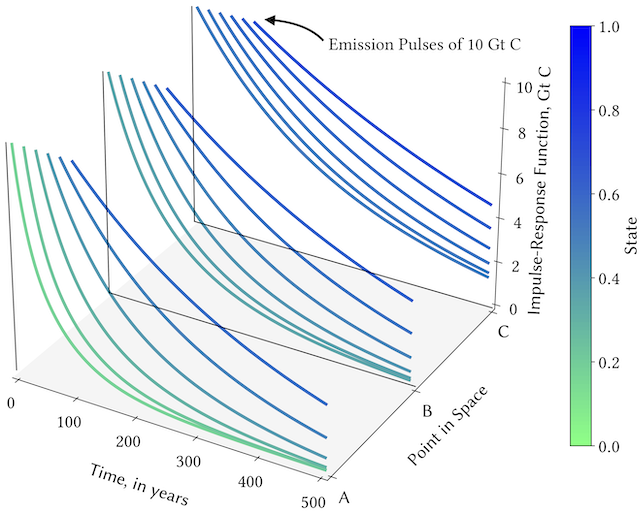PhD project offered by the IMPRS-gBGC in Jan 2025
Unlocking Rapid Climate Projections and Attribution: A Next-Generation Climate-Carbon System Emulator |
|
Alexander J Winkler,
Guilherme Mendonça,
Christian Reimers,
Alexander Brenning,
Carlos Síerra
|
Project descriptionImagine being able to run a dynamic climate carbon cycle model on your personal computer, analyze the results, and make future climate projections in just a few minutes (even before your coffee gets cold). This is the promise of climate-carbon system emulators. While there are exciting developments on their way, current tools are still limited. This project aims to push for a next-generation climate-carbon system emulator based on impulse-response functions and machine learning that respects state-dependency in space and time.What are impulse-response functions? Impulse-response functions are mathematical functions that can simulate the response of the coupled carbon-climate system to different trajectories of fossil-fuel emissions impulses. These functions help us understand the time-scales of the Earth system’s response to these perturbations and have played a significant role in climate policy. Recent developments have shown that impulse-response functions can be applied to spatially-varying temperature responses, rather than just global time-series (Freese et al., 2024). This step allows for predictions of carbon and temperature responses to emissions in spatial grids, or response maps. Additionally, new studies have demonstrated the importance of accounting for a temporally-evolving state in the climate-carbon system to accurately predict the impact of emission impulses (e.g., Winkler et al., 2024). Especially lagged carbon sequestration processes in land carbon dynamics, such as vegetation shifts, ecological succession, land cover, and demographic shifts, introduce legacy effects and state dependency in the system when estimating the warming potential of carbon emissions. Develop a new climate-carbon system emulator! These new findings present an opportunity to develop a sophisticated climate-carbon system emulator. This project will introduce an innovative approach that adapts impulse-response functions to develop a climate-carbon system emulator, incorporating the state-dependency in both space and time (illustrated in Figure 1; Winkler and Sierra (in review). By leveraging neural networks and Markov chain Monte Carlo (MCMC) methods, we will develop functions that are state-variant in both space and time, allowing us to account for past emission trajectories. The ultimate goal is to create a powerful tool that accurately, yet rapidly, represents and predicts the state-dependent responses of the Earth system to carbon emissions across space and time, providing crucial insights into legacy effects, such as: What is the full global warming potential of an unit CO2 released into the atmosphere today compared to an unit released in the past? What can we do with such climate-carbon system emulator? This climate-carbon system emulator will not only help address various scientific questions, but also unlock a wide range of applications. For instance, it will enable more accurate climate change attribution studies, allowing us to pinpoint the impact of specific emissions on regional climate changes. So, we could quantify the temperature increase in India, for example, solely due to emissions from the US and Europe, or quantify the full warming effect of sector-specific emissions, such as the burning of natural gas, throughout the historical past and future scenarios. This emulator will be a rapid, open-source tool, enabling global researchers to explore climate-carbon system dynamics in minutes, not months, and empowering them to contribute to climate solutions, regardless of their resources or budget. Working groupThe successful PhD candidate will work in the Atmosphere-Biosphere Coupling, Climate and Causality group of the Department of Biogeochemical Integration at the Max Planck Institute for Biogeochemistry. The PhD candidate will benefit from the European Lab for Learning and Intelligent Systems (ELLIS) and will work closely with the ELLIS Unit Jena.RequirementsWe are looking for a highly motivated candidate with experience in Earth system science and machine learning, i.e., master’s degree in Physics, Meteorology, Environmental Sciences, Geoinformatics, Computer Science, Mathematics, or similar. Experience or knowledge in machine learning / deep learning techniques is advantageous but not mandatory.The Max Planck Society (MPS) strives for gender equality and diversity. The MPS aims to increase the proportion of women in areas where they are underrepresented. Women are therefore explicitly encouraged to apply. We welcome applications from all fields. The Max Planck Society has set itself the goal of employing more severely disabled people. Applications from severely disabled persons are expressly encouraged. ReferencesFreese, L. M., Giani, P., Fiore, A. M., and Selin, N. E. (2024). Spatially Resolved Temperature Response Functions to CO2 Emissions. Geophysical Research Letters, 51(15):e2024GL108788.Winkler, A. J., Myneni, R., Reimers, C., Reichstein, M., and Brovkin, V. (2024). Carbon system state determines warming potential of emissions. PLOS ONE, 19(8):e0306128. Winkler, A. J. and Sierra, C. A. (in review). Towards a New Generation of Impulse-Response Functions for Integrated Earth System Understanding and Climate Change Attribution. Geophysical Research Letters, pages 1–15.  |